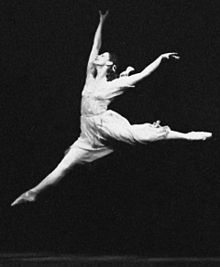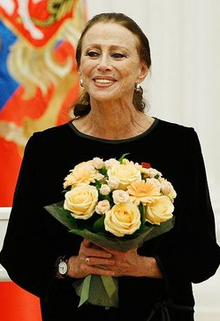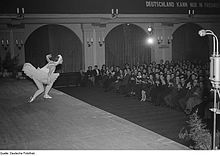Maja Michailovna Plisetskaya
Maja Michailowna Plissezkaja ( Russian Майя Михайловна Плисецкая , scientific transliteration Majja Michajlovna Pliseckaja ; born November 20, 1925 in Moscow ; † May 2, 2015 in Munich ) was a Russian prima ballerina and choreographer and one of the world's most successful ballet dancers .
Life

Maja Plissezkaja comes from a Russian-Jewish ballet family. Her uncle Asaf Messerer was a well-known ballet teacher who significantly influenced early Soviet ballet through his students. Her aunt Schulamit Messerer was also a prima ballerina of the Bolshoi Ballet and traveled around the world as a ballet teacher at the age of 81.

The mother of Maja Plissezkja, Rachil Messerer (1902-1993) came from Vilnius and was an actress in silent and sound films; her father Michail Plissezki , born in Gomel in 1899 , first worked in the Commissariat for Foreign Affairs and Trade of the All-Russian Central Executive Committee and in 1932 became head of the Arktikugol coal mining company in Barentsburg on Svalbard . There he also exercised the function of consul general. In 1936 the family returned to Moscow.
Plisetskaya's youth were shaped by Stalinism . Her father was arrested on April 30, 1937 and executed in early 1938. The family did not obtain detailed information about his whereabouts until 1989. Her mother was also arrested and taken to the Alschir camp , the Akmola camp for the wives of traitors to the country . Until 1940 Maja Plissezkaja was looked after by her aunt Shulamit.
The family problems with the regime ensured that the later prima ballerina of the Bolshoi Ballet was initially not allowed to accompany her company on tours to non-socialist countries . Since 1943 she was a member of the ballet ensemble of the Bolshoi Theater , which also made guest appearances abroad after the Second World War , but it was not until 1959, at the age of 34, that she went on a tour of the USA with the Bolshoi Ballet for the first time .
The dying swan was her glamorous role, which she danced several thousand times. At home and abroad she was considered the definitive successor to the legendary Anna Pavlova . She staged the greatest choreographers, among them Roland Petit and Maurice Béjart . Maja Plissezkaja danced for over six decades and her career was extraordinarily long for a ballet dancer. She gave her last performance in 1996 at the age of 71.
Maja Plissezkaja was married to the composer Rodion Shchedrin since 1958 , for whose ballet music she developed the choreographies several times. The couple last lived in Moscow and Munich . Maja Plissezkaja died of a heart attack on May 2, 2015 in Munich .
On November 20, 2016, her 91st birthday, the statue " Plisetskaya Carmen", created by the sculptor Viktor Mitroshin on the initiative of Valery Gergiev and showing the dancer in one of her prime roles, was shown in a park on Bolshaya Dmitrovka Street in Inaugurated near the Bolshoi Theater .
Own choreographies
- Anna Karenina after Tolstoy , music by Rodion Shchedrin, 1972
- The seagull according to Chekhov , music by Rodion Shchedrin, 1980
- The Lady with the Dog according to Chekhov, music by Rodion Shchedrin, 1985
Awards
Maja Plissezkaja received numerous national and international honors during and after her career. Not only did she become an honorary professor at the Paris Sorbonne (since 1987) and at the Moscow Lomonosov University (since 1993), an honorary doctorate at the Hungarian Dance Academy in Budapest and since 2008 a member of the International Academy of Natural and Social Sciences ( Armenian branch), but it has also received numerous awards - for example B. with the Russian Ballet Prize Soul of Dance in the category “Legend” or the Lithuanian Barbora Radvilaitė Order . Further prizes and medals awarded to her are:
- People's Artist of the RSFSR (1956)
- People's Artist of the USSR (1959)
- Anna Pavlova Prize (1962)
- Lenin Prize (1964)
- Order of Lenin (1967, 1976 and 1985)
- Anniversary medal "In memory of the 100th birthday of Vladimir Ilyich Lenin" (1970)

- Ordre des Arts et des Lettres (1984)
- Hero of Socialist Labor (1985)
- Knight of the French Legion of Honor (1986)
- Orden de Isabel la Católica (1991)
- Gold Medal for Services to Art (1991)
- Order of Merit for the Fatherland , 3rd Class (1995)
- Order of Merit for the Fatherland, 2nd Class (2000)
- Order for Services to Lithuania (2003)
- Prince of Asturias Prize for Art (2005)
- Praemium Imperiale (2006)
- Order of Merit for the Fatherland, 1st Class (2006)
- Gloria Artis Medal for Cultural Merit , Poland (2008)
- Vittorio De Sica Award , Italy (2009)
- Order of the Rising Sun (2011)
- Officer of the French Legion of Honor (2012)
- Order of Merit for the Fatherland, 4th grade (2010)
literature
- Maija Plisetskaya: Me, Maija . The prima ballerina of the Bolshoi Theater tells about her life. From the Russ. by Bernd Rullkötter. - 1st ed., Complete, corrected and added a foreword. Paperback edition - Bergisch Gladbach: Lübbe, 2006, ISBN 3-404-61602-2
Web links
- Literature by and about Maja Michailowna Plissezkaja in the catalog of the German National Library
- Official site of the Plisetskaya-Shchedrin Foundation
- Maya Plisetskaya archive in the archive of the Academy of Arts, Berlin
Footnotes
- ↑ Vesna Mlakar: Hand in hand with music, tirelessly working for dance (ensuite, issue 96, December 2010, accessed May 3, 2015)
- ↑ a b Azary knives: Мама Ра. История семьи Мессерер (Чайка Seagull Magazine, October 16, 2009, Russian, accessed May 3, 2015)
- ↑ Ballet legend Maja Plissezkaja dies ( Die Welt , May 2, 2015, accessed May 3, 2015)
- ↑ World ballet star Maja Plissezkaja has died. ( Yahoo News, May 3, 2015, accessed May 3, 2015)
- ^ Monument to Maja Plisetskaya unveiled in Moscow . In: RUSSIA BEYOND THE HEADLINES , November 22, 2016. Accessed November 30, 2016.
- ↑ Awarded in Paris ( Memento des Originals from September 12, 2011 in the Internet Archive ) Info: The archive link was automatically inserted and not yet checked. Please check the original and archive link according to the instructions and then remove this notice.
- ↑ awarded by the Spanish King Juan Carlos
- ^ Winner of the international art and culture award in the theater / film category, awarded in Japan
- ↑ awarded "for their outstanding contribution to the development of choreography in Russia and in the world"
- ↑ awarded "for the unparalleled career and exceptional service in the field of dance"
| personal data | |
|---|---|
| SURNAME | Plisetskaya, Maya Mikhailovna |
| ALTERNATIVE NAMES | Плисецкая, Майя Михайловна (Russian); Pliseckaja, Majja Michajlovna (scientific transliteration) |
| BRIEF DESCRIPTION | Russian ballet dancer and choreographer |
| DATE OF BIRTH | November 20, 1925 |
| PLACE OF BIRTH | Moscow |
| DATE OF DEATH | May 2, 2015 |
| Place of death | Munich |

